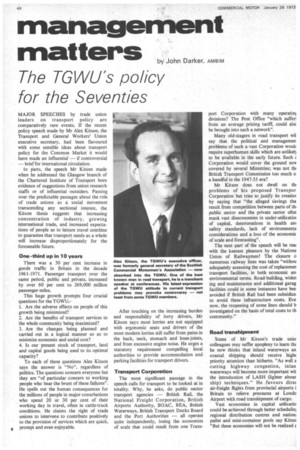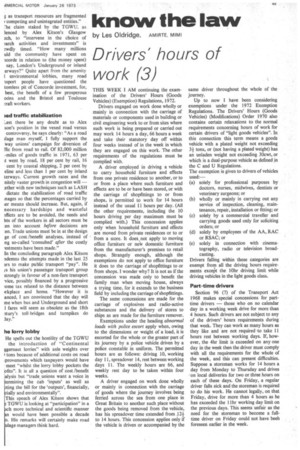management
Page 50

Page 51

If you've noticed an error in this article please click here to report it so we can fix it.
matters by John Darker, AMBIM
The TGWU's policy for the Seventies
MAJOR SPEECHES by trade union leaders on transport policy are comparatively rare events. If the recent policy speech made by Mr Alex Kitson, the Transport and General Workers' Union executive secretary, had been flavoured with some sensible ideas about transport policy for the Common Market it would have made an influential — if controversial — brief for international circulation.
In parts, the speech Mr Kitson made when he addressed the Glasgow branch of the Chartered Institute of Transport bore evidence of suggestions from union research staffs or of influential .outsiders. Passing over the predictable passages about the role of trade unions as a social movement transcending any sectional interest, the Kitson thesis suggests that increasing concentration of industry, growing international trade, and increased expectations of people as to leisure travel combine to guarantee that transport needs as a whole will increase disproportionately for the foreseeable future.
One-third up in 10 years There was a 30 per cent increase in goods traffic in Britain in the decade 1961-1971. Passenger transport over the same period, public and private, increased by over 60 per cent to 269,000 million passenger-miles.
This huge growth prompts four crucial questions for the TGWU: 1. Are the adverse effects on people of this growth being minimized?
2. Are the benefits of transport services to the whole community being maximized?
3. Are the changes being planned and carried out in a logical manner so as to minimize economic and social cost?
4. Is our present stock of transport, land and capital goods being used to its optimal capacity?
To each of these questions Alex Kitson says the answer is "No", regardless of politics. The questions concern everyone but they are "of particular concern to working people who bear the brunt of these failures". He spells out the human consequences for the millions of people in major conurbations who spend 20 or 30 per cent of their working day in travel, often in cattle-truck conditions. He claims the right of trade unions to intervene to contribute positively to the provision of services which are quick, prompt and even enjoyable. After touching on the increasing burden and responsibility of lorry drivers, •Mr Kitson says most lorries are not equipped with ergonomic seats and drivers of the most modern lorries still suffer from pains in the back, neck, stomach and knee-joints, and from excessive engine noise. He urges a statutory requirement compelling local authorities to provide accommodation and parking facilities for transport drivers.
Transport Corporation
The most significant passage in the speech calls for transport to be looked at in totality. Why, he asks, do public sector transport agencies — British Rail, the National Freight Corporation, British Airports Authority, BOAC, BEA, British Waterways, British Transport Docks Board and the Port Authorities — all operate quite independently, losing the economies of scale that could result from one Trans
port Corporation with many operatini divisions? The Post Office "which suffer from an average pricing tariff, could alsc be brought into such a network".
Many old-stagers in road transport wil say that the political and managemen problems of such a vast Corporation woulc require superhuman skills which are unlike].) to be available in the early future. Such ; Corporation would cover the ground nov covered by several Ministries; was not till British Transport Commission too much o a handful in the 1947-55 era?
Mr Kitson does not dwell on dm problems of his proposed Transpor Corporation but tries to justify its creatior by saying that "the alleged iavings tha result from competition between parts of th4 public sector and the private sector oftei mask vast diseconomies in under-utilizatioi of capital, deteriorations in health am safety standards, lack of environmenta considerations and a loss of the economie of scale and forecasting".
The next part of the speech will be real with the keenest pleasure by the Nations Union of Railwaymen! The closure c numerous railway lines was taken "withou adequately assessing the cost of replacemen transport facilities, in both economic an environmental terms. Road-building, widen ing and maintenance and additional garag facilities could in some instances have bee avoided if British Rail had been subsidize to avoid these infrastructure costs. Eve now, the reopening of some lines should b investigated on the basis of total costs to th community."
Road transhipment Some of Mr Kitson's trade unio colleagues may suffer apoplexy to learn ths he now thinks that inland waterways an coastal shipping should receive high( priority attention than hitherto. "As well a cutting highway congestion, inlan waterways will become more important wit the introduction of LASH (lighter aboar ship) techniques." He favours dire( air-freight flights from provincial airports i Britain to relieve pressures at Londo Airport with road transhipment of cargo.
Vast economies in capital utilizatio could be achieved through better schedulinl regional distribution centres and nation; pallet and mini-container pools say Kitsoi "But these economies will not be realized s g as transport resources are fragmented I competing and unintegrated entities." 'he claim staked by the TGWU. as lenced by Alex ICitson's Glasgow ech, to "intervene in the choice of :arch activities and investments" is !.wdly timed. "How many millions uld the community have spent on icorde in relation to (the money spent) say, London's Underground or inland erways?" Quite apart from the amenity environmental lobbies, many road isport people have questioned the tomless pit of Concorde investment, for, best, the benefit of a few prosperous odns and the Bristol and Toulouse ;raft workers.
mod traffic stabilization
est there be any doubt as to Alex son's position in the vexed road versus controversy, he says clearly: "As a road ilage man myself, I fully support the way unions' campaign for diversion of Ffic from road to rail. Of 82,000 million -miles of goods traffic in 1971, 63 per it went by road, 18 per cent by rail, 16 cent by coastal shipping, 2 per cent by cline and less than I per cent by inland terways. Current growth rates and the nitely vaster growth in congestion will — ether with new techniques such as LASH dictate the stabilization of road traffic inages so that the percentages carried by Ler means should increase. But, again, if necessary hardships and wasteful ifficts are to be avoided, the needs and hts of the workers in all sectors must be :en into account before decisions are .en. Trade unions must be in at the design ge of cost /benefit analyses, instead of ng so-called 'consulted' after the costly 'estments have been made."
In the concluding paragraph Alex Kitson ademns the attempts made in the last 25 trs to make public transport "pay". He fs his union's passenger transport group strongly in favour of a non-fare transport vice, possibly financed by a progressive :ome tax related to the distance between irkplace and home. "However it is anced, I am convinced that the day will me when bus and Underground and short
I fares will seem as obsolete as the 18th ltury's toll-bridges and turnpikes do lay."
he lorry lobby He spells out the hostility of the TGWU the introduction of "Continental ggernaut lorries" with axle weights over
I tons because of additional costs on road Lprovements which taxpayers would have meet "whilst the lorry lobby pockets the ofits". It is all a question of cost /benefit .alysis but -trade. unions want a voice in ermining the cab 'inputs' as well as sting the bill for the 'outputs', financially, ially and environmentally".
This speech of Alex Kitson shows that TGWU is looking at "participation" in a ch more technical and scientific manner n would have been possible a decade . His remarks will certainly make road ulage managers think hard,




























































































